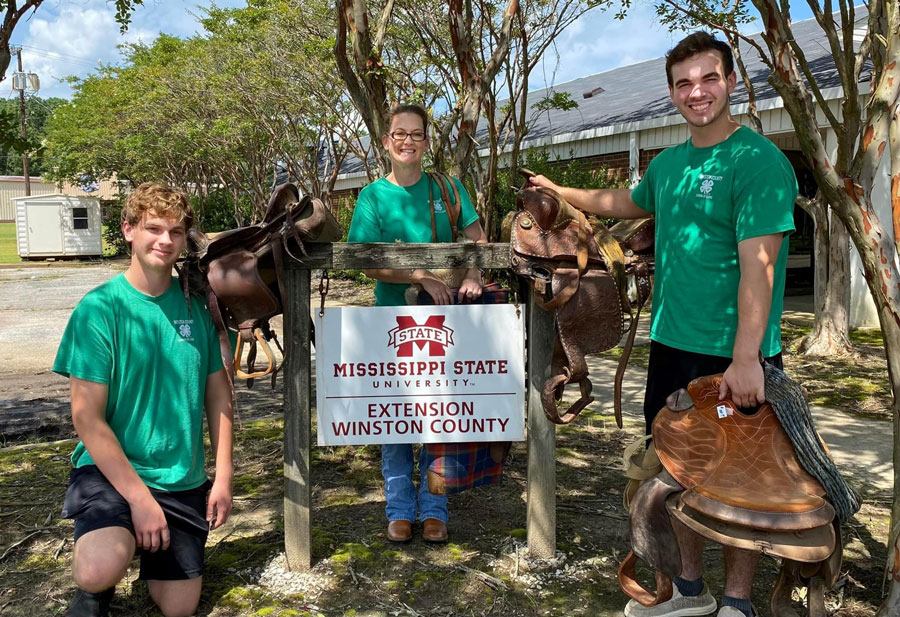Choosing to Lead

Winston County 4-H volunteer Dr. Molly Nicodemus, left, with Mississippi’s first-place winning hippology team, including Rebekah Schilling, Emma Creel, Devin Miller, and Bobby Culwell, with Tracy Gregory, Extension agent in Winston County.
4-H Horse Club volunteer teaches life skills
Meet Molly, 4-H volunteer leader for the Winston County 4-H Horse Club!
Winston County 4-H Hippology Team wins state
When it comes to the study of horses—hippology—the Winston County 4-H Hippology Team has proven just how good they are: they won the overall top award in Mississippi for the senior (ages 14–18) division.
Rebekah Schilling, Emma Creel, Devin Miller, and Bobby Culwell will be traveling to Georgia in August for the Southern Regional 4-H Horse Championships!
TEAM WINS
First in Team Exam/Slides Contest
First in Team Station Identification Contest
First in Team Problem Contest
INDIVIDUAL HONORS
First in every hippology contest
High-Point Hippology Senior 4-H’er
Devin Miller
First in Senior Public Speaking
Devin Miller
Third in Senior Public Speaking
Emma Creel
First in Senior Individual Demonstration
Devin Miller
Second in Senior Team Demonstration
Emma Creel and Rebekah Schilling
Q&A with Leah Barbour • Photos submitted
She knew she wanted to teach even when she was just a kid, but Dr. Molly Nicodemus also realized pretty quickly that she wanted to teach older students at the college level. Now an associate professor in the Department of Animal and Dairy Sciences at Mississippi State University, Nicodemus has embraced a new teaching role with adolescents and teens as a volunteer leader for the Winston County 4-H Horse Club.
What made you decide to become a registered 4-H volunteer?
Research shows the benefits to young people of interacting with horses, which makes me even more passionate about this program. Also, when I started in 2000 at MSU and started recruiting students, the first groups I recruited came from 4-H. We can recruit all kinds of kids from 4-H, but we’ve got to start early!
Parents are a big part of 4-H—being able to interact and build a foundation. Kids give a lot to 4-H; they take on responsibility, give their time, and dedicate themselves to learning, to the project, or to the activity we’re doing. It can be a win-win for the parents and the kids.
Why is teaching kids about horses important to you?
It’s nice to work with that younger generation. Whether they learn a bunch of horse information or not, the kids get the whole experience of working as a group, working as a team, and working on preparation for the different events. 4-H has value no matter what the kids are doing.
What are your greatest accomplishments as a 4-H volunteer?
It’s amazing—the life skills that kids learn from 4-H. It may not have anything to do with the subject matter; 4-H teaches confidence, self-esteem, and time management, whatever the project. Speaking as a person teaching at the college level, trust me, I know that this is experiential learning that will probably teach you more than a lecture will. When the kids get hands-on experience, they learn faster. When these kids get to college with all this really good experience, it becomes a valuable resource, and they are much easier to teach.
How did you find out about the opportunity to volunteer?
I just got pulled in to volunteer—my husband actually started before me in the shooting sports program, and he said, “I’m not doing this alone,” and I agreed, saying, “No, we are a team.” So, while I didn’t know much about shooting sports, I knew how to organize paperwork and how to get parents together and go do all these different events. And now, we do all of our practice at my sister-in-law’s place, and we work with 4-H’ers year-round.
How did you become a registered 4-H volunteer in your county?
There’s a lot of unknowns for parents, like what the process consists of, how to do it, what the rules and requirements are for the project area, and it can deter parents from signing up to volunteer. You have to pay for a background check and complete the paperwork, and the whole process can be a lot for parents. But, without volunteers, there’s no 4-H program, and these programs are just so useful because the kids need activities—they need learning by doing.


